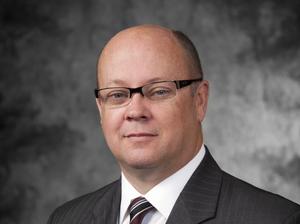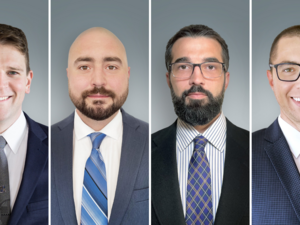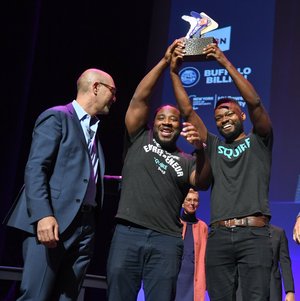Not long ago, blockchain and cryptocurrency felt like mere concepts.
That time has passed.
Opportunistic projects are beginning to crop up throughout Buffalo, causing excitement in some cases and concern in others.
Sure, most people still spend normal money, use traditional software and invest in things like stocks and bonds.
But there's a growing group who believe blockchain is fertile ground for business opportunities. And they're having an impact on everything from banking to entrepreneurship to startup tech.
These are their stories.
Crypto 'mining' is here, causing opportunity and concern
A blockchain is a high-tech system for storing data. Blockchain mining is the controversial process of recording and analyzing that data.
Western New York is suddenly becoming a hot spot for mining projects – meaning server farms that exist to serve blockchains and generate cryptocurrency.
Miami-headquartered US Bitcoin Corp has installed a mining operation at the old Dupont site on Buffalo Road in Niagara Falls, working recently with the city to mitigate noise concerns.
“We found Upstate New York primarily because there are a lot of facilities with access to electricity, which is a big need in our industry,” chief operating officer Asher Genoot said. “We thought it would be a great opportunity to take over some existing sites, retrofit and upgrade them, and hopefully bring a new industry into the area.”
Toronto-based Digihost recently began the hiring process for its mining facility at 1070 Erie Ave. in North Tonawanda, despite pushback and legal actions from neighbors over potential noise and environmental concerns. The project has passed all necessary municipal thresholds, but still must be approved by the state Public Service Commission.
The publicly traded firm (NASDAQ: DGHI) earns bitcoin from its mining services.
“We are also moving forward with site work, including underground electrical infrastructure and other work required by the approved site plan to comply with town codes,” said Nick Williams, Digihost in-house counsel. “This includes laying down concrete pads to eventually house the data center servers. This is critical infrastructure for new technology, and the operations at the plant will provide stronger grid resiliency.”
More Bitcoin miners are on the way. New York City-based Wattum issued a news release in November saying that it was acquiring property in Niagara Falls to provide “hosting services for (Wattum) clients and partners to do Bitcoin mining.” The company said the new facility would be open by the end of 2021.
Financial services
Five Star Bank wants its digital banking platform to be a curated selection of financial activities for customers, not just a place to pay bills and check balances.
So the bank inked a partnership with two fintech firms that allows its customers to buy and sell bitcoin, a cryptocurrency which has exploded in value over the past five years.
The service, which debuted this fall, allows people to invest anything from pocket change to $100,000 in bitcoin through Five Star.
Bank executives say it’s a signal to customers and potential investors that meaningful digital experiences aren’t the sole domain of large banks and fintechs.

“We see this as a very important signal to the market that we are forward-thinking, and through the safety and soundness of a bank, that we can deliver digital currency right to our customers,” said Sean Willett, Five Star’s chief administrative officer. “It says, ‘There is a community bank right in your backyard that you can look into, and transact with, through the channel of your choice.”
Five Star isn’t the only financial industry company in Buffalo whose executives see a big opportunity in cryptocurrency.
Buffalo-based Berkley Capital Management opened its doors earlier this year with the premise that cryptocurrency could offer the stability of the bond market but with much better returns.
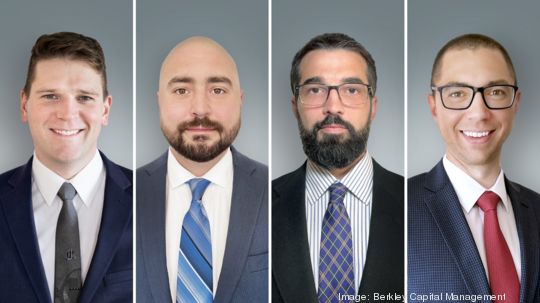
Berkley is an advisory company for accredited investors that focuses on the cryptocurrency markets. Its co-founders say their service will steer investors toward cryptocurrencies called “stablecoins,” which are backed by outside assets such as the U.S. dollar.
“What we offer are cryptocurrency investment strategies for fixed income investors,” said William Boyle, Berkley’s director of investment strategy. “If a business wants a high yield on money they have sitting in a bank account, that’s where we come in.”
The company was started by four co-founders and longtime friends, including Benjamin Duggan, who managed about $170 million in assets at KeyBank before co-founding Berkley.
Duggan said earlier this year that interest in the cryptocurrency consultancy is running hot as investors look for ways to beat the dreary bond market.
“In essence, they’re able to buy into an asset that behaves like the U.S. dollar,” said Duggan, director of investor relations. “All my existing clientele are yield-starved at this point. Imagine a double digit yield just by owning a dollar.”
Startup
VeriTX doesn’t have a blockchain product, per se.
But the Buffalo-based startup is making blockchain a key part of its strategy, using it to build highly secure applications that will appeal to its customers in the defense and aerospace industries.
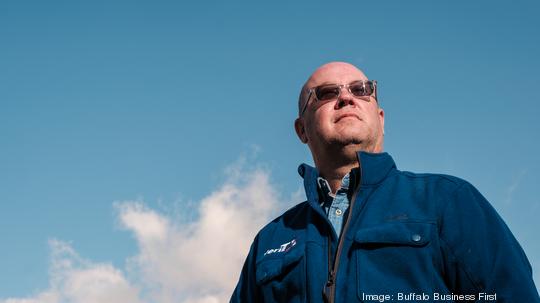
VeriTX is led by James Regenor, a retired U.S. Air Force colonel who holds three masters degrees and held management roles at Moog Inc.
The company is developing what Regenor calls a “digital supply chain,” where manufacturers can send blueprints to end-users, which can then manufacture them on-site.
The Air Force recently awarded VeriTX a $2 million “demonstration” project that will serve as a validation point for the startup’s technology.
Regenor says that his company’s blockchain-based solutions will be used to protect sensitive data in the Air Force’s legacy systems. When major manufacturers want to do business with the government, they will have to transact on the VeriTX marketplace.
“I see us becoming the digital Amazon marketplace for the government,” Regenor said. “We’re leveraging the best of blockchain to create a data-secure environment within a cyber-secure framework.”
Regenor – whose company was a finalist in this year’s 43North competition but did not ultimately win a prize – says VeriTX now has six full-time employees. The firm now has 24 patents in various stages of finalization as it seeks to firm up its IP portfolio while maturing its products.
“If we can make this work, it’s a billion-dollar business,” he said.
Buffalo Blockchain Alley
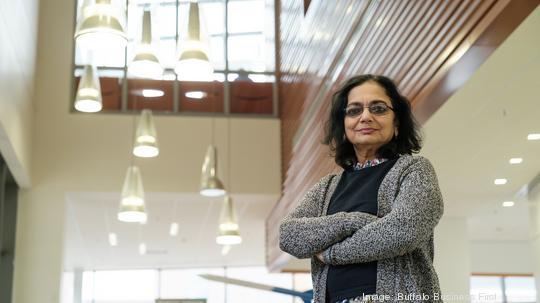
Bina Ramamurthy, director of the University at Buffalo's Blockchain ThinkLab, had barely heard of blockchain technology it until February 2017, when she attended an evening seminar at Davis Hall on UB’s Amherst campus.
Her education instincts were immediately piqued and she looked into massive online open course offerings for blockchain, expecting it to be populated by Ivy League colleges and professors from tech hubs. There was nothing.
Ramamurthy wrote four “Blockchain Specialization” courses for Coursera, which have since been taken by hundreds of thousands of students. Her “blockchain application development” course at UB was full this semester at 125 students. She decided to run the course again next semester; it filled up immediately.
Ramamurthy is writing her second book about blockchain. She has spoken widely about it, including addresses in front of the New York Department of Financial Services and Interpol. She’s sought-after on a regional basis as well – she’s scheduled to brief Hunt Real Estate agents on blockchain and cryptocurrency in the coming weeks.
And UB’s ThinkLab has become an active research site, with Ramamurthy overseeing graduate students pursuing two different funded projects.
The most exciting part is yet to come. Ramamurthy has been approved to open a physical lab at Parker Hall on UB’s South Campus, which will be open to the public. She envisions seminars with community groups and high school students.
The complexity of blockchain technology is a barrier to entry, and Ramamurthy said there is still room for Buffalo to carve out a meaningful place in the industry.
“Think about a Buffalo Blockchain Alley – a learning point and a research point for anyone in the community,” Ramamurthy said. “This will be a physical space where anyone can walk or take the train. We’ll get them started. After that, it’s up to them."


